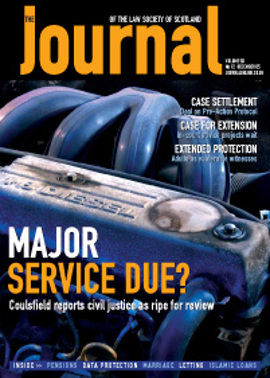Too small to be flexible?
Flexible working in the medium/smaller firm, once considered an impossibility or, at the very least, an impracticality, can now be seen not only as a practical solution to the drift of talented staff out of the profession but a positive boon – encouraging experienced and talented solicitors to remain in private practice.
“Flexible working”, of course, is a hot topic following recent legislative changes and, in our own context, the recently published Law Society of Scotland/EOC survey. Although work-life balance policies have tended to focus on women, flexible working should not be seen as an issue excluding men. No longer are men expected to support their families simply by being at work; they are expected to contribute to their family and support their spouses’ careers by being at home. Nor is flexible working solely for the purposes of childcare; as our population ages, caring for elderly relatives becomes a more pressing issue. Flexible working may also be seen simply as a lifestyle choice.
So far so pleasantly idyllic – but can these aspirations translate into practicalities in the gritty world of the small to medium sized legal firm? And, more to the point, why would you want them to?
At Bonar Mackenzie we have found that we have not only retained solicitors but have attracted new and talented staff by offering a flexible attitude to working practices. “Flexible”, although it includes part time work, can also include full time hours outwith the usual 9-5, homeworking, reduced hours and job sharing, all of which are practised at Bonars. This extends both up and down the business: three of our partners, one associate and one third of our support/secretarial staff are on various forms of flexible working.
There are several advantages of offering flexible working patterns:
- Increased staff retention – the immediate impact of loss of staff is felt in the cost (and risk) of recruiting new employees (and with the loss of fee earning time involved, the impact is felt most keenly in small/medium firms without an HR department to manage this process). Factored in should also be the less visible costs such as loss of knowledge and expertise and severed client contacts.
- Improved recruitment opportunities – once flexible working is embraced, the recruitment pool widens considerably. Research carried out in England suggests that while large firms may recruit relatively high numbers of newly qualified women, generally they are “uninterested in women returners”– a valuable pool of experienced, talented individuals to be drawn upon by firms prepared to offer that sought-after flexibility.
- Improved morale, productivity and commitment and less absenteeism – a firm which recognises the need for its staff to balance their professional and personal commitments will be rewarded in spades with commitment both to making the arrangement work and to advancing the firm’s business goals.
- Flexibility breeds flexibility in return – flexible workers will often assist in providing cover at busy periods or holidays, a resource of particular value to the small/medium firm which often does not carry the extra capacity to deal with fluctuating demands.
- External perceptions – for the firm which manages this process there is the added bonus of recognition as an enlightened, forward-thinking firm, willing to embrace change.
Some points in managing flexible working:
- Flexible working must be aligned with business need, a process that requires commitment, communication and trust on both sides.
- An excellent support team is essential in providing a continuous point of contact for the client.
- The use of technology – voicemail, email and computer systems accessed remotely, digital dictation and mobile phones all make the physical location of the solicitor far less important.
In a profession which equates long hours in the office with commitment, where does this leave the flexible worker? A change of perception is required which measures commitment in terms of quality of work (rather than hours present) and which reviews profitability and benefit in an overall context.
It has long been apparent that there has been a drift of talent, educated and trained by the profession, away from private practice into institutions and government where they can obtain flexible working conditions without prejudicing their rise to senior levels.
Flexible working should be seen by the medium/smaller firms not as a threat but an opportunity to attract talent and expertise into their business: a means to differentiate themselves from their competitors in order to recruit and retain staff, if they are prepared to take the lead and change the way they approach working patterns.
In this issue
- Holes in Scotland's corporate killing proposals
- A month of contrasts
- Too small to be flexible?
- Engine overhaul
- Vital voices revisited
- Letting in the law
- Puzzles and paradoxes
- Legacy giving in a Scottish climate
- New deal for PI claims
- Data protection crackdown: do you comply?
- In real terms
- Access route
- Better law-making: just lip service?
- Appealing prospects
- The limits of diversification
- Cashing in on the event
- Farewell then common law marriage
- Scottish Solicitors Discipline Tribunal
- Website reviews
- Book reviews
- Unveiling the Islamic mortgage






